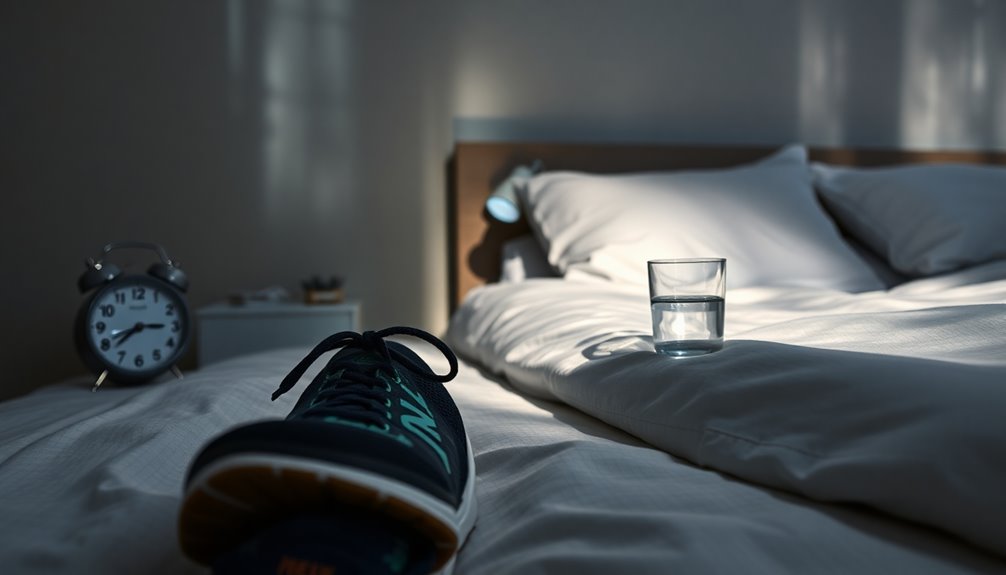Sleep plays an essential role in your running performance by promoting recovery, enhancing mental clarity, and supporting physical health. When you get sufficient quality sleep, your muscles recover better and your immune system stays strong, reducing the risk of illness. With adequate rest, you'll also experience improved endurance and decision-making during runs. If you want to know more about optimizing your sleep for peak performance, there are plenty of strategies to explore.
Key Takeaways
- Quality sleep enhances muscle recovery and growth, leading to improved running performance and reduced injury risk.
- Runners require 7-10 hours of sleep for optimal endurance and cognitive function during training and races.
- Sleep deprivation can significantly decrease mental clarity and decision-making abilities, impacting race strategies.
- Insufficient sleep weakens the immune system, increasing susceptibility to illness and hindering training consistency.
- Deep sleep stages promote essential processes like protein synthesis and glycogen replenishment, vital for effective recovery.

Zeacool Fitness Tracker with 24/7 Heart Rate, Blood Oxygen Blood Pressure Sleep Monitor, Activity Trackers 5 ATM Waterproof,Step Calorie Counter Pedometer Health Smart Watch for Women Men (Black)
24/7 Heart Rate Monitor :This blood pressure watch supports real-time dynamic heart rate, blood oxygen, blood pressure ,Sleep…
As an affiliate, we earn on qualifying purchases.
As an affiliate, we earn on qualifying purchases.
The Importance of Sleep for Runners

When you prioritize sleep, you're not just resting; you're actively enhancing your running performance. For runners, quality sleep is vital for recovery and muscle growth.
Deep NREM sleep stages facilitate muscle repair, while REM sleep boosts memory consolidation, sharpening your strategic thinking during races. If you skimp on sleep, you risk increased fatigue, diminished endurance, and slower reaction times, all of which can negatively impact your pacing and overall performance.
Additionally, sleeping less than seven hours elevates your chances of injuries and illnesses due to weakened immune function. Regular sleep deprivation also heightens perceived exertion, making runs feel tougher and affecting your motivation and mental health. Furthermore, ensuring proper nutrient intake alongside adequate sleep can significantly enhance recovery and performance in runners.

DUMOS Memory Foam Pillows for Sleeping 2 Pack, Bed Pillows for Adults with Washable Cover and Breathable Mesh, Gel Cooling Pillow for Back and Side Sleeper Support, White
COMFORT VENTILATION: The honeycomb design of this collection of gel foam pillows ensures constant airflow for added ventilation,…
As an affiliate, we earn on qualifying purchases.
As an affiliate, we earn on qualifying purchases.
Recommended Sleep Duration for Optimal Performance

Sleep is an essential component of your training regimen, and understanding the recommended duration can greatly impact your running performance.
- Runners typically need 7-9 hours of sleep per night.
- Intense training may require up to 10 hours for peak performance.
- Sleep deprivation of less than 7 hours can decrease endurance and increase perceived effort.
- Elite athletes often benefit from 8-10 hours to enhance their recovery.
Maintaining consistent sleep patterns is vital for your running performance. Insufficient sleep not only raises the risk of injuries but also hampers recovery. Additionally, unique culinary experiences can provide nourishing meals that support your training efforts.
Aim for the recommended sleep duration to maximize your endurance and overall performance. Prioritizing quality rest is key to achieving your goals and keeping you at your best on the track.

MZOO Luxury Sleep Eye Mask for Side Sleeper Men Women, Zero Eye Pressure 3D Sleeping Mask, Light Blocking Patented Design Night Blindfold, Soft Eye Shade Cover for Travel, Black
Zero Eye Pressure: The Deepest 13mm arc-shaped widened eye cups provide makeup-safe space and allow natural blinking
As an affiliate, we earn on qualifying purchases.
As an affiliate, we earn on qualifying purchases.
Sleep's Role in Muscle Recovery and Growth

While you might focus on training hard, it's crucial to remember that muscle recovery hinges considerably on the quality of your sleep. Sleep plays a critical role in releasing growth hormones during deep sleep stages, promoting tissue repair and muscle growth. During this time, your body also engages in protein synthesis and glycogen replenishment, imperative for healing muscles damaged during intense workouts. Adequate sleep enhances your ability to adapt to training stress, boosting athletic performance and minimizing injury risk. In contrast, being sleep-deprived raises cortisol levels, hindering recovery and growth. Additionally, maintaining a well-balanced diet, which includes grass-fed butter, can support your overall recovery efforts.
| Sleep Quality | Effects on Recovery |
|---|---|
| High Quality | Faster recovery, improved growth hormones |
| Moderate Quality | Adequate protein synthesis |
| Low Quality | Increased cortisol, higher injury risk |
| Sleep-Deprived | Reduced glycogen replenishment |

Nature Made Wellblends Sleep and Recover, Sleep Aid with Melatonin 3mg to Support Restful Sleep, plus L theanine 200mg and Magnesium Citrate, 44 Gummies
SLEEP BLEND WITH RESULTS YOU CAN FEEL(3): Nature Made Wellblends Sleep and Recover Gummies (44 CT) provide 3…
As an affiliate, we earn on qualifying purchases.
As an affiliate, we earn on qualifying purchases.
How Sleep Affects Mental Clarity and Decision-Making

Adequate rest not only supports muscle recovery but also sharpens your mental acuity, which is essential in competitive running. When you prioritize sleep quality, you enhance your cognitive function, leading to better decision-making and reaction times during races.
- Improved mental clarity boosts performance outcomes.
- Sleep deprivation can result in a 20% decline in cognitive ability.
- Better sleep fosters memory retention and learning of new strategies.
- Consistently getting 7-9 hours of quality sleep aids strategic racing.
Without sufficient rest, your judgment may falter, impairing your ability to pace and respond to race dynamics. Furthermore, practicing stress management techniques can further enhance your sleep quality, contributing to better overall performance.
To maximize your overall health and running performance, focus on improving your sleep habits for a sharper mind on race day.
The Connection Between Sleep and Immune Function

When you don't get enough rest, your immune system can take a hit, making it harder to fend off illness. For runners, sleep is essential for maintaining immune function; inadequate sleep can lead to increased susceptibility to infections.
Studies show that those who sleep less than 7 hours are considerably more prone to upper respiratory infections. Sleep deprivation also elevates stress hormones like cortisol, which suppresses immune function and disrupts training consistency.
On the flip side, athletes who prioritize good sleep hygiene and average 7 or more hours of sleep enjoy better overall performance and fewer sick days. Additionally, relaxation before sleep is crucial for enhancing the body's ability to recover and maintain a strong immune system.
Tips for Improving Sleep Quality

To boost your sleep quality, start by establishing a consistent sleep schedule; going to bed and waking up at the same time each day can make a big difference. Next, create a sleep environment that's dark, quiet, and cool to help you achieve deeper rest. These simple adjustments can lead to better recovery and performance in your running. Additionally, practicing deep breathing techniques can further enhance relaxation and reduce tension, promoting a more restful night's sleep.
Consistent Sleep Schedule
Establishing a consistent sleep schedule is essential for optimizing your running performance, as it helps regulate your body's internal clock.
When you go to bed and wake up at the same time daily, you enhance your circadian rhythm, leading to improved quality of sleep and sleep duration.
Here are some tips to maintain that consistency:
- Stick to your sleep schedule, even on weekends.
- Gradually adjust your sleep routine before competitions.
- Limit variations to avoid sleep disturbances.
- Focus on a wind-down routine to promote deeper sleep.
Additionally, ensuring adequate hydration before sleep can help prevent issues like ear pressure during colds, which may disrupt your rest and recovery.
Optimize Sleep Environment
A consistent sleep schedule lays the groundwork for a restorative night's rest, but the environment in which you sleep plays an equally important role.
To optimize sleep quality, create a cool, dark, and quiet sleep environment that helps regulate your body temperature and minimizes disturbances. Limit blue light exposure from screens at least an hour before bedtime to enhance sleep onset and overall sleep.
Incorporate relaxation techniques like deep breathing or gentle stretching to signal your body it's time to wind down. Comfortable bedding, including a supportive mattress and pillows, is essential for reducing discomfort and enhancing deep sleep. Additionally, consider using an air purifier to improve air quality, which can further support restful sleep and overall health.
The Consequences of Sleep Deprivation on Running Performance

When you skimp on sleep, the consequences for your running performance can be profound. Here's what you might face:
- Decreased cardiovascular endurance
- Impaired reaction time and decision-making
- Increased fatigue and hormonal imbalances
- Compromised recovery and training consistency
Missing just one night of sleep can greatly reduce your endurance, making every run feel tougher.
Sleep deprivation elevates stress hormones, weakening your immune system and increasing illness risks. Over time, this leads to fatigue and lower glycogen stores, leaving you with less energy for your workouts.
You might also struggle to regulate body temperature during exercise. Ultimately, chronic sleep loss hampers your performance, affecting pacing and race outcomes. Additionally, incorporating best home security systems could help ensure a safe environment for quality sleep, further enhancing your running success.
Prioritizing sleep is essential for ideal running success.
Frequently Asked Questions
Does Sleep Affect Running Performance?
Absolutely, sleep affects your running performance.
When you don't get enough rest, you'll likely feel more fatigued and your workouts can seem tougher. Your reaction times and decision-making skills may decline, making it harder to maintain an effective pace.
Plus, lack of sleep hampers muscle recovery and growth, which is vital for your training.
If you want to perform at your best, prioritizing sleep is essential for your overall endurance and performance.
Does Sleep Affect Athletic Performance?
Yes, sleep definitely affects your athletic performance.
When you get enough rest, you'll notice improvements in reaction times, decision-making, and overall stamina.
Insufficient sleep can lead to decreased accuracy in skills and increased fatigue, making it harder to perform at your best.
If you're aiming for peak performance, prioritizing sleep is essential.
Does Sleep Really Affect Performance?
Imagine your body as a finely tuned engine; without the right fuel, it sputters. Yes, sleep really affects performance.
When you skimp on sleep, you're not just losing hours; you're clouding your focus, slowing your reaction time, and increasing fatigue. Your body's ability to perform at its peak diminishes, leaving you feeling like a shadow of your potential.
Prioritizing rest helps you rev up those engines, ensuring you're ready to tackle any challenge.
Is It Okay to Run off 4 Hours of Sleep?
Running off just 4 hours of sleep isn't ideal, and you might find it challenging.
Your endurance could suffer, making even short runs feel tougher. You may also notice slower reaction times and difficulty concentrating, which can affect your pacing and decision-making.
Plus, a lack of sleep increases your risk of injury and illness.
It's better to prioritize rest to guarantee you perform at your best and recover effectively.
Conclusion
So, you thought you could power through that 5 AM run on just a few hours of sleep? Ironically, while you're dreaming of breaking personal records, your body's in a slow-motion rerun. Sleep's not just a luxury; it's your secret weapon. Prioritize it, and you'll find that those late-night Netflix binges don't quite compare to the thrill of a new PR. After all, who needs energy when you can have a cozy pillow fight instead?









